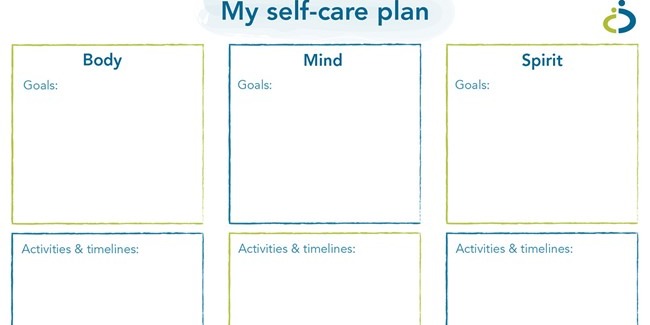Creating an effective self-care plan involves several steps to enhance well-being and manage stress proactively.
1. Evaluate Current Coping Strategies: Assess how you currently manage stress using the Lifestyle Behaviors (pdf). Determine which strategies support your well-being and identify any that may be detrimental. Aim to reduce negative coping methods and incorporate more positive ones into your routine.
2. Assess Your Current Self-Care Practices: Utilize the Self-Care Assessment to identify existing self-care practices and assess any gaps or imbalances. Highlight areas where you excel and pinpoint domains that require more attention to prevent burnout. Consider adding new practices that promote overall well-being and ensure each aspect of self-care is adequately represented.
3. Implement Maintenance Self-Care: Define “maintenance self-care” activities crucial for your well-being and commit to performing them regularly. Identify potential obstacles that could hinder these activities and develop strategies to overcome them. Document these solutions on the My Maintenance Self-Care Worksheet and note any efforts to limit or eliminate negative coping strategies.
4. Prepare for Emergencies: Develop an emergency self-care worksheet to navigate challenging circumstances should they arise unexpectedly. While rare, having a proactive framework in place ensures readiness and reduces stress during difficult times.
5. Commit to Personal Well-being: Acknowledge the importance of prioritizing self-care. Address any reservations or tendencies to prioritize others over yourself. Recognize that self-care is essential not only for personal well-being but also for effectively meeting professional and personal commitments.
6. Share and Seek Support: Share your self-care plan with supportive individuals such as friends, family, or colleagues. Exchange self-care strategies, seek encouragement, and consider joining a support group to boost your commitment and exchange ideas.
7. Follow Through with Your Plan: Once you’ve completed assessments and worksheets, implement your personalized Self-Care Plan. Monitor your progress regularly to celebrate successes and address any unexpected challenges. Remain flexible and adjust your plan as needed. Remember to utilize your emergency plan if faced with emotionally demanding situations.
By committing to regular self-care practices and seeking support when needed, individuals can enhance resilience, manage stress effectively, and maintain overall well-being. Regular evaluation and adjustment of your self-care plan ensure it remains effective in promoting physical, emotional, and mental health. Prioritizing self-care not only supports personal well-being but also strengthens the ability to meet professional and personal obligations effectively.
- Lisa D. Butler













